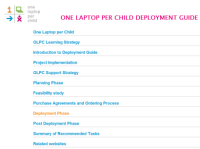Resumen en español al final del artículo
As far as we understand it, constructionism is not something that you believe in, it is something that you do.
At the student's level, constructionism is illustrated by what he does with his computer: writing, sharing, thinking. And back again.
At the teacher's level, constructionism describes the way he creates a rich environment for learning: by providing students with new tools, by letting them find their way through their own mistakes, by indirectly supporting the transformation of information into knowledge.
As an OLPC grassroots, what do we do?
We explore the XO and Sugar. We translate software and pedagogical material. We test activities and we try to improve them. When we have this opportunity, we try to understand what it takes to "deploy" XOs. We gather experience and we document it. Moreover: we dare to do mistakes because we do our best. And because our goal is clear: it is not to directly fix education, it is to create a rich environment for other deployments.
As an example of such a "rich environment", OLPC France is glad to share with you its own version of the OLPC deployment guide: the English version can be found here, and the French one here.
As a PDF, the original deployment guide is static: you can only read it. As a wiki page, this guide can potentially evolve, however the wiki version is not easy to read, and very few people will dare to update it. Our thinking has been this: let's release a version that people can easily read and comment. Let's pave the way for an updated version, one that will take feedback into account.
Let's call this "organizational constructionism". Help us - please read this version and comment freely on it. Tell us what is wrong, what is too general. Share your experience. Make it necessary to have a new version later on. A version that will reflect the experience of OLPC as a community, not as an organization that has the final word on how things should be. Participate!
(Thanks to Sean Daly for his careful proofreading.)
Bastien Guerry (Google+) is a volunteer with OLPC France. OLPC France recently refreshed their Web site, thanks to Soykje, so if you haven't been there in a while make sure to check it out!
Resumen en español:



Bastien -- can you please rename that deployment guide to "OLPC France deployment guide"?
"OLPC Deployment Guide" is the one we have been publishing and maintaining for a while. I really do not want to spread confusion -- when we recommend that a deployment team reads our Deployment Guide, there shouldn't be a dozen of them out there.
We used to keep it in our wiki, but for various reasons it migrated away from it. Amongst other things, we found that documents that are for a small number of readers, maintained by an even smaller number of people with direct experience in deployment management/coordination... are not an easy match for an "anyone edits" wikipage.
But I am glad to see efforts to try a wiki-style one, and if it works we may use bits or all of it.
But _give it a different name_. Then if it's good, we can start saying, for example, "read the OLPC Deployment Guide, and for additional ideas and materials read the OLPC France Deployment Guide".
thanks! m
Done.
But I would prefer OLPC to host the files and maintain an augmented version (why not?)
If OLPC is not interested, someone from the larger OLPC community could take over maintainership and we should then call it "OLPC Community Deployement Guide".
Because I doubt OLPC France will have the time and energy to maintain both the french augmented version and the english one (I will ask our team.)
Anyway -- if the HTML files don't move to OLPC or if no one is interested in maintaining the evolving version, I'll simply delete the directory to avoid confusion.
Thanks for the rename!
Well, OLPC isn't willing to carry it, because the wiki open/edit model didn't lead us anywhere good (compared to a privately maintained/edited effort); possibly because it is a highly specialized topic.
OLPC France is doing this because you think you can manage it better and sustainably. I am interested to see what happens if you give it a chance. Let's wait and see, if it works out _then_ we'll love to host the results. :-)
Only the french version of the "open" deployment guide is really a project *of* OLPC France. We are willing to maintain and let this one grow, based on our experience. Perhaps, given this experience, this will evolve into a "small deployments guide", who knows.
The english version is just there is case someone finds it useful -- we don't want to prove anything with it. I just thought this "someone" could be OLPC :-) If this proves *not* useful, we'll gladly delete it.
I'll keep you (and olpcnews) updated about our progress on the french version. Since this is plain text in git repo, revisions will be easily traceable.
Ew, do you really want constructivism. It is what gets kids frustrated, confused, feeling like a failure. Can you imagine being told "no, that is wrong" many times over? How do you get to the well known 3 or even 7 to 1 ratio of praise to punishment? (where punishment is "no that is wrong")
You all need to look at federally funded Project Follow Through. Look at the results for self esteem. Guess what - direct instruction score higher than the constructivist methods - by a LOT.
Now take a look at Khan Academy. It still needs lots of improvement but they are, essentially, using data from the students to make the curriculm better. That is one part (of many) of Direct Instruction.